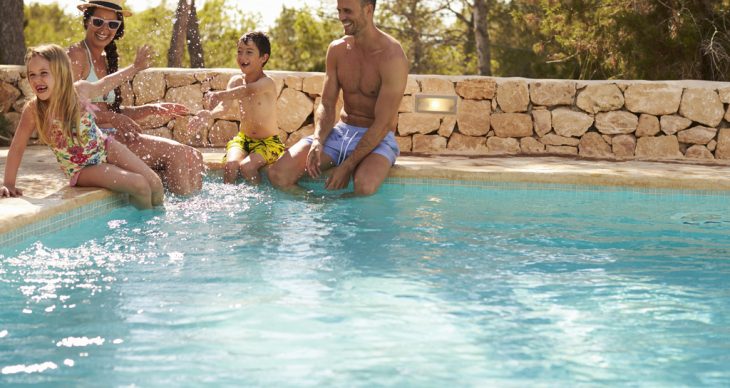You have a great backyard, but it’s missing something. A big, beautiful pool for you and your family to enjoy during nice hot weather. Whether you live in an area where the weather is sunny and hot practically all year round or a region where it’s warm enough to swim outside for only a few months each year, there are pool financing options that can help you make the most of your property.
According to HomeAdvisor, building a pool costs between $17,152 and $45,073. Costs include materials, labor and the size of the pool. Here are some types of pools you might consider getting for your home and how much they cost, on average, according to HomeAdvisor estimates.
Inground pools can range from $36,750 to $66,550. The material the pool is made of can change the price estimates, though. For example, a gunite or concrete inground pool costs between $35,000 and $65,000. A fiberglass inground pool costs between $20,000 and $60,000. An inground vinyl pool can cost between $20,000 and $50,000.
Above-ground pools are the most cost-effective and range from $700 to $3,600 in general. With materials and labor, they can cost between $800 and $15,000.
A custom pool is any pool that requires special planning for shape, size and ability to fit into the property. It may also include unique features, like water features and slides. These can cost upwards of $100,000 or more.
A cocktail pool, or spool, is a very small inground pool that often doubles as a spa/hot tub, too. Some additional features include built-in benches, too. Cocktail pools can range in price from $20,000 to $25,000, despite their small size.
A plunge pool, or dipping pool, is another very small inground pool that’s a little larger than a hot tub and approximately less than four feet deep. Despite their small size, these pools can cost between $20,000 to $25,000.
A lap pool is a rectangular pool that is longer than it is wide. Though not usually Olympic size (which would cost a lot more), it is typically 40-feet long and is meant for back-and-forth swimming. These pools cost between $40,000 and $60,000.
An endless pool is one that uses propellers to create broad yet non-turbulent currents that you can swim against. It serves the same purpose as a lap pool but takes up a lot less space. These can range in price from $23,000 to $40,000.
A saltwater pool is any pool that uses salt water instead of chemically treated water, usually chlorine or bromine. Installing one of these pools can cost between $12,000 and $67,000, depending on size and materials. However, you can convert a chemically treated pool to a saltwater pool for $1,000 to $5,000.
While the type of pool you get can impact how much it costs to install, any additional construction to your property to prepare the area for installation or to finish off the project can significantly impact how much you pay.
For example, if you don’t already have a room for an indoor pool, you can expect to pay between $40,000 and $200,000. If that space already exists and just needs converting, expect your costs to be cut in half.
Another example is if you want the pool to be accessible from a deck, which may require another construction team to come in and extend the deck or add new features that make the pool blend in more with the deck. Features like diving boards, ladders, built-in steps or ramps, other accessibility features and pool heating systems will also affect how much the pool costs overall.
Maintenance costs are not included in the above estimates. That means you also pay between $500 to $4,000 for water treatment chemicals, cleaning services, equipment, repairs and general maintenance. Depending on the kind of maintenance you need at a given time, you could be paying weekly, monthly or annual costs. For example, you might pay a pool cleaner every week but pay once per month for water treatment chemicals. And if you have a vinyl pool, you will likely have to pay for a vinyl liner replacement every 10 years.
You will also have one-time costs for your items like your own cleaning equipment if you plan to clean it yourself and a pool cover. And you may pay more for your homeowners insurance due to increased liability. You may even purchase floatation devices, pool toys and games, poolside furniture and other accessories for your pool, which can add up over time.




